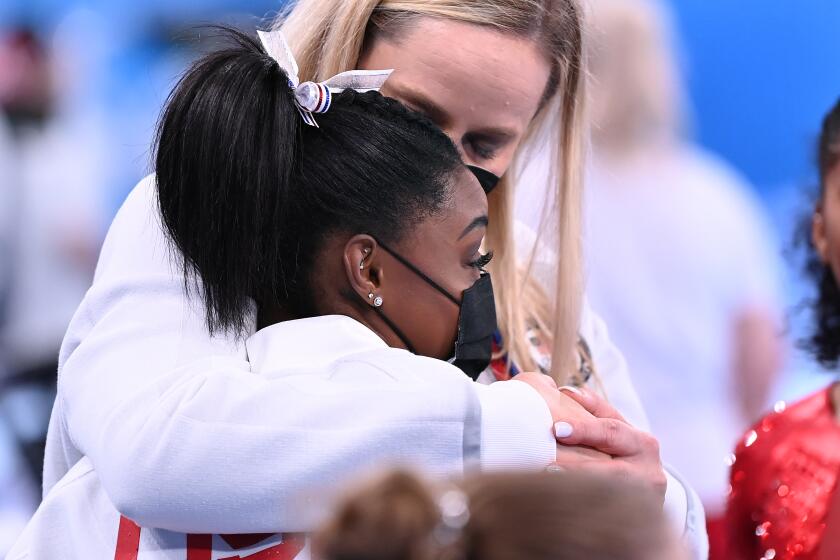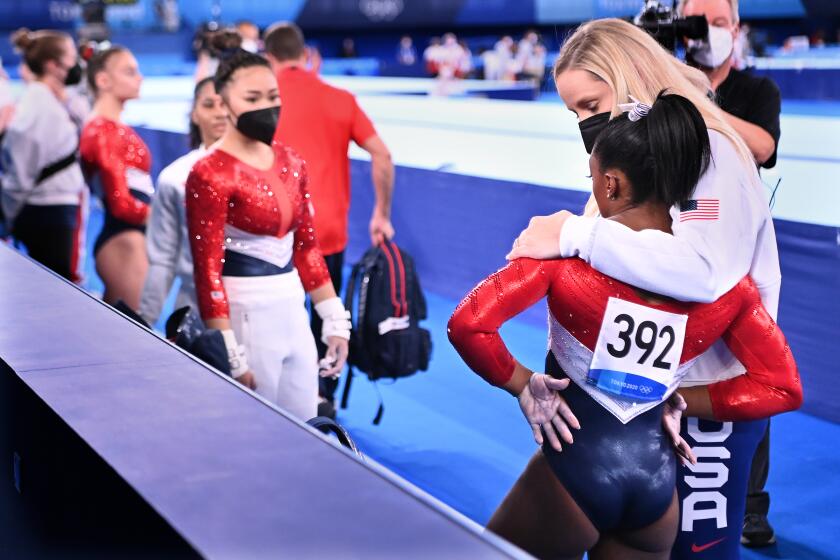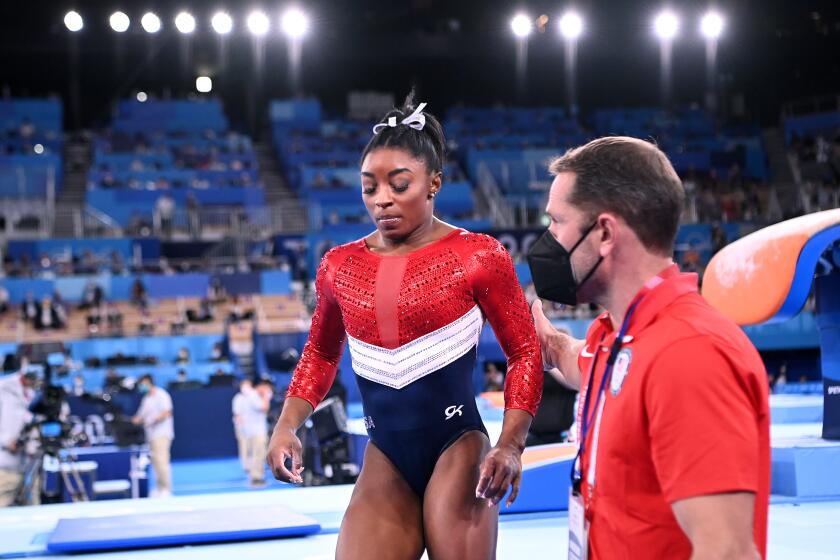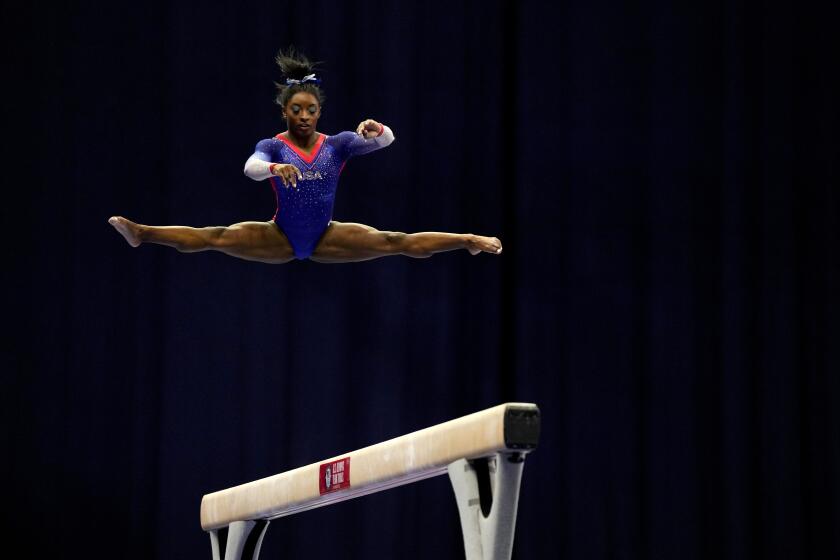Simone Biles’ Olympic scratch shines light on mental health in gymnastics
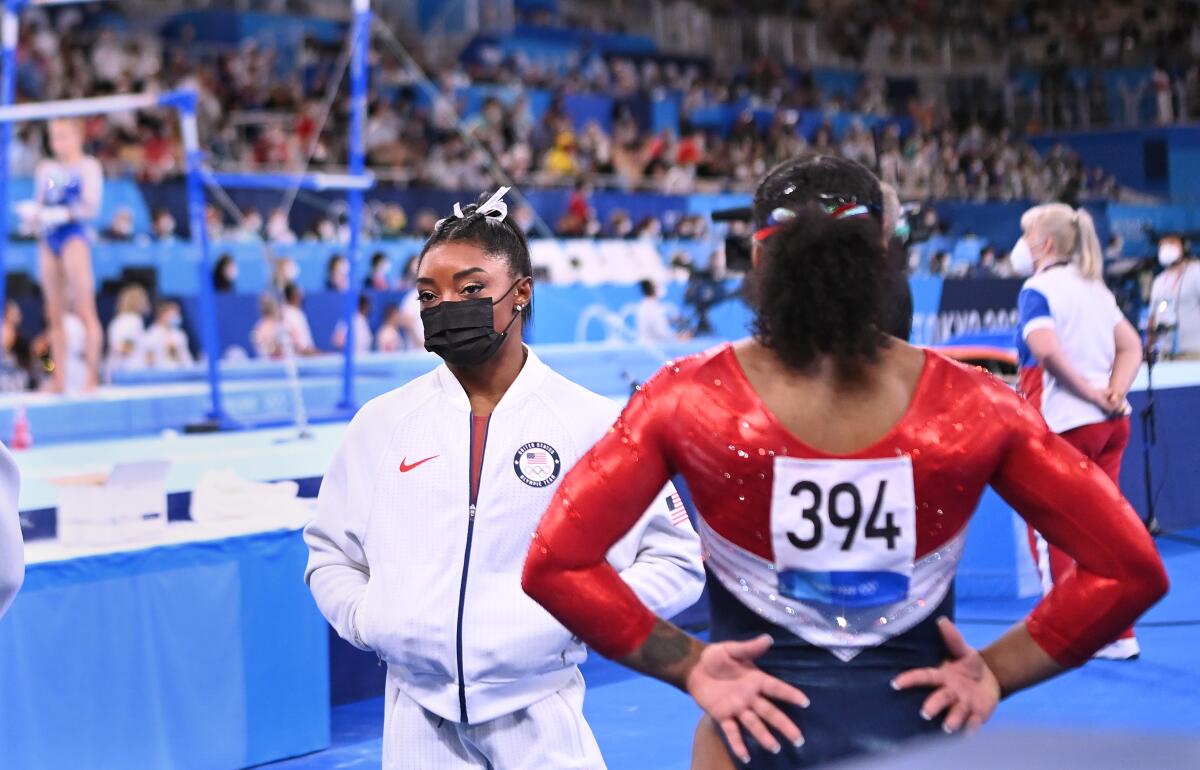
- Share via
Chris Waller could barely process what he was seeing. Simone Biles, by his account, the most dominant athlete in the world, had bailed on her planned vault. She nearly fell. Then she walked off the competition floor.
“Just absolutely stunned speechless,” Waller, UCLA’s gymnastics coach, said of Biles’ shocking scratch from the women’s gymnastics team final on Tuesday.
Despite another sudden turn of events at the Olympics, the gymnastics world still celebrated Team USA’s silver medal in the team event and lauded Biles for what could be another game-changing move on an international stage as she stepped away from competition to prioritize her mental health.
Critics who say U.S. gymnast Simone Biles choked or quit don’t understand the pressure she faces and need to shut up, columnist Bill Plaschke writes.
“People are going to remember Simone Biles not only as the G.O.A.T. from a gymnastics sense, but what she’s been able to do from the well-rounded, mental health, sexual abuse, all the other advocacies she’s been working towards,” Olympic silver medalist Samantha Peszek said. “I think it’s forced a lot of people to take a good hard look at what they do and to push everyone to be better.”
The U.S. produced what Waller called a “herculean achievement” by rallying to claim silver after Biles withdrew from competition following the first event where she competed a relatively simple 1 ½ twisting vault compared to her planned 2 ½-twist skill.
Jeff Graba knew from watching Biles’ warmup attempt that something was wrong. The Auburn gymnastics coach, whose brother coaches Team USA’s Sunisa Lee, was relieved that Biles and her coaches made the safe decision to pull her out of competition.
“The gymnastics she does, [it was] probably a really good decision to not keep pushing,” Graba said. “That’s too dangerous.”
Without Biles, incoming UCLA freshman Jordan Chiles added uneven bars and balance beam to compete in the all-around. She struggled on the two events during the qualifying meet but hit both routines in the final.
U.S. gymnast Simone Biles says her belief you must ‘put mental health first before your sport’ prompted her to withdraw from team competition.
Grace McCallum, who will attend Utah next year, led off on all four events and was a perfect eight for eight in her Olympic performances. Three months ago, she returned to the gym after a hand injury.
“What she’s done on the world stage is a little bit mind blowing,” Utah coach Tom Farden said.
After Biles pulled out of competition before the second rotation, McCallum led off on bars with a 13.7 to steady the team, followed by a 14.166 from Chiles. Then Lee anchored the lineup with a 15.4 that was tied for the highest individual score in the team final.
“She’s tough like that,” said Graba, who will coach Lee this fall at Auburn. “She’s tough as nails.”
Through it all, Biles was never far from the spotlight. She cheered on her teammates. She passed them the chalk dish. She told them she loved them.
It shows “what it truly means to be a team,” Peszek said.
More than a decade ago, Peszek stood on the same Olympic stage. She was 16 when she was chosen as a member for the 2008 Olympic team that won silver in Beijing. The media mixed zone, where reporters gather to ask questions outside of the formal news conference, featured “the most horrifying, offensive questions,” she said. It affected the team.
Losses and missteps by Simone Biles, Naomi Osaka, Katie Ledecky and U.S. women’s soccer and men’s basketball teams have these Olympic Games in trouble.
The increased media attention is only a small part of the Olympic pressure cooker.
“The Olympics is all about representing your country,” said Waller, who competed for the U.S. in Barcelona in 1992. “That feeling of knowing that you’re out there representing your country, that is inspiring, it also brings with it plenty of pressure. It’s just a whole other ball game with millions of eyeballs from not only your country but other countries on you.”
Biles’ position as one of the most decorated gymnasts of all time only increased the spotlight entering the Tokyo Games as she continued to debut gravity-defying skills that rewrote the code of points.
“I was in her shoes in terms of being an Olympian, but I would never pretend like I know what it’s like to be Simone Biles,” Peszek said.
After the team qualifying meet, where Biles overcame a shaky performance to advance to all five individual finals, she wrote on Instagram, “I truly do feel like I have the weight of the world on my shoulders at times.”
On Tuesday, she asked for help carrying the load.
“It’s extremely brave of her to be able to do that,” Graba said. “You’re taking yourself out of everything you wanted. For her to step up and say that, it put [mental health] front and center, and by default, it’s going to give a lot of power to young people who watch that and think, ‘That’s the right thing to do.’ It is the right thing to do.”
Graba said the situation exhibited the “new version of USA Gymnastics” where athletes are given a voice and coaches are willing to listen. The organization is still marred by scandals of sexual, emotional and physical abuse and was the target of Biles’ criticism since former national team doctor Larry Nassar was found guilty of sexually abusing hundreds of women.
Gymnastics experts and those who have watched Simone Biles’ evolution explain how and why she became so much better than anyone else.
Biles told reporters she will take things day by day with respect to competing in the individual event finals, which take place Thursday. If she doesn’t compete, the next-highest qualifier would take her place, which means Americans Jade Carey and MyKayla Skinner would compete in all-around and vault, respectively.
In college gymnastics, which is often seen as the place where elite gymnasts come to rediscover joy in the sport after years of punishing Olympic training, coaches are reminded of the importance of mental health for their own athletes. Waller said it emphasized the importance of encouraging athletes to speak up immediately.
“We know the pressures are real,” said Farden, whose Utes finished third at the NCAA championships last season.
The efforts could trickle down to even younger gymnastics. Peszek has previously thought about incorporating more mental health training into her popular “Beam Queen Bootcamp” sessions for young athletes but is now motivated to fully implement her plans.
“The stronger you are in terms of your mental health, I think the stronger you are going to be in terms of your mental choreography for competition and be a more well-rounded athlete in general,” Peszek said. “There’s nothing but positive things that can come from an increased focus on mental health.”
More to Read
Go beyond the scoreboard
Get the latest on L.A.'s teams in the daily Sports Report newsletter.
You may occasionally receive promotional content from the Los Angeles Times.

